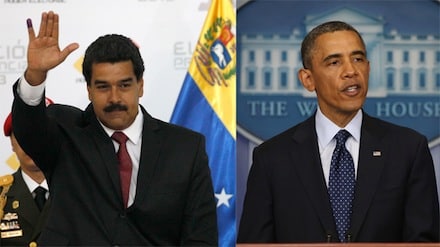This week regional leaders from 35 Latin American and Caribbean nations meet at the Seventh Summit of the Americas. The meeting in Panama will be a historical encounter ending the 50-year exclusion of Cuba from the Organization of American States.
Both presidents Obama and Raul Castro will be present and a highly-anticipated meet and greet between them has the potential to rapidly advance a thaw in relations and an end to the unpopular US embargo against Cuba.
While Latin American governments have applauded the Obama administration’s efforts to reestablish ties with Cuba, hope for a renewed relationship with the region has been tainted by the US government’s recent actions against Venezuela. A unanimous statement from the Community of Latin American and Caribbean States (CELAC), which represents all 33 countries in the region, has firmly condemned the March 9, 2015 Executive Order issued by President Obama declaring Venezuela “an unusual and extraordinary threat to the national security and foreign policy of the United States.” The CELAC statement also rejected the corresponding sanctions imposed by the US government against Venezuelan officials, considering them “coercive measures contrary to international law.”
The Venezuelan Government has mounted a successful international campaign to denounce the absurdity of Obama’s Executive Order, pointing out that their country has neither the military or economic might to pose a threat to the United States. In addition to CELAC, the 134 nations of the Group of 77 + China also issued a statement deploring the measures against Venezuela, and more than 10 million people have signed a petition demanding Obama retract the Executive Order. Even the US Government’s closest ally in the region, Colombia, has called on President Obama to reconsider his posture towards Venezuela.
The designation of Venezuela as “an extraordinary threat” to US national security has not only been considered baseless by the region, but now even President Obama’s own National Security Advisors have publicly stated the US Government does not consider Venezuela a threat to its national security and they have admitted the language used in the Executive Order was “pro forma” in order to justify the sanctions. This admission cynically came on the eve of Obama’s trip to Panama for the Summit of the Americas.
The Obama administration could reverse the downward spiral of its reputation in Latin America by positively engaging President Nicolas Maduro at the Summit of the Americas and accepting Venezuela’s, and the region’s, calls for dialogue. A good first step was this week’s visit of State Department Counselor Thomas Shannon to Caracas to meet with Venezuela’s Foreign Minister. But the most effective move would be to rescind the Executive Order and eliminate the sanctions imposed against Venezuelan officials, as the region has petitioned.
By admitting the language used to invoke the executive authority to impose sanctions against Venezuela was just a template and not reflective of legitimate belief or fact, the Obama administration has essentially invalidated its own decree. This moment should be seized as an opportunity to set relations with Venezuela back on track.
The two nations have continued to be important commercial partners, despite the deterioration in diplomatic relations. Venezuela remains a major provider of oil for US consumption and a significant importer of US goods. But the sanctions could hinder this relationship and cause undue hardships for communities and businesses in both nations.
The cohesive response of Latin American governments in support of Venezuela should not be taken lightly by the Obama administration. Through organizations such as CELAC and the Union of South American Nations (UNASUR), the region has shown that unity and integration is not only possible but necessary to advance development, despite ideological differences.
If the United States truly wants to be a regional partner, as President Obama has suggested, then it’s time to abandon interventionist policies and forge relations based on respect for sovereignty and the right to self-determination. The olive branch to Cuba is a positive step. But if he wants to ensure a genuine legacy in the region, President Obama should listen to Latin American leaders and rescind his recent measures against Venezuela.
Reprinted with permission from RT.


